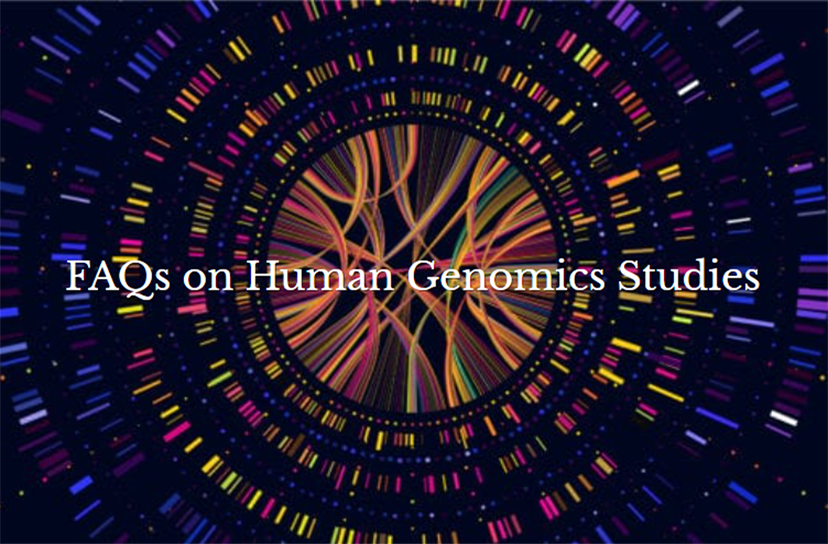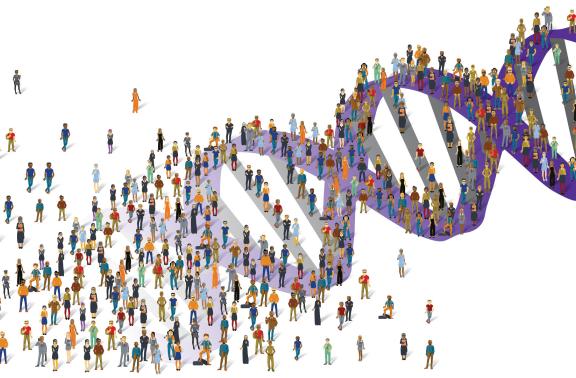
FAQs on Human Genomics Studies
FAQs on Human Genomics Studies are produced and managed by The Hastings Center
"The need for socially responsible communication about genomics research is greater than ever. New research into genomic influences on traits such as intelligence, educational attainment, household income, and sexual behavior is drawing media attention and public scrutiny. These social and behavioral traits are known to be influenced by a combination of genetic, social, and environmental factors. But attempts to draw conclusions about the capabilities of individuals or groups of people based on genetics has an ugly history, infused with racism and other biases. Today, research on the genetic contributions to human behavior and social outcomes is still being misappropriated by those who are looking for evidence to justify their beliefs in inherent racial and social inequalities. In response, many genetic scientists have taken steps to pre-emptively avoid misconceptions and misapplications of their work by creating frequently asked questions (FAQs) to explain their findings in specific studies. These FAQs give the context, scope, and limitations of their research."
For more information on the FAQs on Human Genomic Studies, please visit the Hastings Center website or click here.
To learn more about submitting materials to the FAQs on Human Genomic Studies, please click here or see below.
"This guide helps authors submitting materials to “FAQs on Human Genomic Studies” and outlines basic criteria for inclusion in the repository. Have a question? Contact the editorial team via [email protected]
Required criteria for inclusion of FAQs are that entries:
- Cater to an interdisciplinary audience and are written in clear, accessible language for non-domain experts
- Pertain to relevant and original scientific research that are of scientific importance in human genetics/genomics
- Aid in the socially and ethically responsible communication of genetic and genomic studies
The editorial team will favorably consider whether submissions relate to studies that have been accepted for publication in established peer-reviewed journals and journals that have affiliations with professional organizations such as the Behavior Genetics Association, American Psychological Association, or American Society for Human Genetics. This does not disqualify materials that accompany pre-prints. FoGS invites and has previously included pre-print entries.
Authors will be asked to submit a copy of their FAQ (via PDF or online link), an accompanying publication or preprint if available (via PDF or online link), and any relevant links for inclusion in the FAQ (e.g., research consortium website). Authors will also be asked to share no more than five key findings/points about their submission. Note that these key findings/points may be subject to editorial revisions – any revisions will be shared with and approved by FAQ authors prior to publication. Please list the corresponding author.
Submissions can be made via [email protected] and will be reviewed on a case-by-case basis. Submissions will be acknowledged upon receipt and authors will be notified of a decision by email. Note that the repository will be updated quarterly (January, April, July, October)."
"The Hastings Center is a nonpartisan, nonprofit organization created from multiple disciplines, including philosophy, law, political science, and education. The Hastings Center was critical to establishing the field of bioethics in 1969 and has been evolving ever since. Founded by philosopher Daniel Callahan and psychoanalyst Willard Gaylin, The Hastings Center is the oldest independent, nonpartisan, interdisciplinary research institute of its kind in the world.
The Hastings Center and its scholars produce publications on ethical issues in health, science, and technology that inform policy, practice, and public understanding of bioethics."


